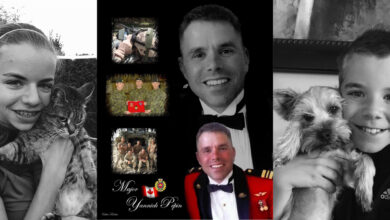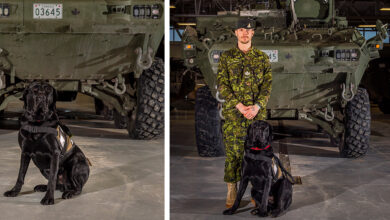Best of CMF Magazine
We Care
This article was originally published in our Winter 2013 Issue.
As the Forum on Mental Health and the Canadian Forces was about to begin the room was full of key players from across the country. Wing commanders, base commanders, padres, social workers, JAGs, the leaders of the of the CF, all met to hear the way forward regarding mental health and military personnel.
Everyone was awaiting the arrival of Peter Mackay, Minister of National Defence, and General Walter Natynczyk, Chief of Defence Staff. Row upon row of military uniforms filled the auditorium; men and women sitting shoulder to shoulder, prepared to face the specter of mental illness that haunts all environments of the Canadian Forces, and remorselessly has found its way into the lives of military families.
A hush fell over the huge room as everyone drew up to a seated attention as the Minister entered.
“It’s like a church, it’s so quiet in here,” someone quipped. Soft laughter. The prevailing silence of uncomfortable uncertainty was broken, and the Canadian Forces Mental Health Forum began.
The discussions that followed will have a direct impact on military personnel and military families. Minister Mackay offered recognition that funding and supporting mental health programs in the CF affects the very ability of the CF to carry out its core mandate, critical to the strength of military families, the country, and the entire nation.
He acknowledged that within the CF, tangible, positive changes have been made. The health care budget has grown, ensuring the CF has the professionals necessary to deal with our mental health issues. At present, “There are 380 full-time mental health professionals currently employed in our services. There is still work to do, although that is the greatest ratio of mental health service providers-to-soldiers in NATO,” said Mackay.
Mackay also focused on the theme of raising awareness. He pointed out that members need to be knowledgeable, “Recognizing and acknowledging PTSD, OSI, and mental illness, and promoting mental health.” Finally, he focused on combating stigma. “There will be encouragement, support and intervention from the top ranks to the newest enlisted soldier.”
General Natynczyk, CDS came to the podium. Within his brief was the declaration: “MFRC’s play a vital role, and we must continue to support families. Families are the strength behind the uniform – military families have to be front and centre in decision making and setting up programs.” Ultimately the message from the top was, “We care. We will care for our mentally wounded. We’re giving soldiers permission to ask for help. We’re recognizing the family often identifies the problem first; therefore, the family is a primary resource.” It seems the military is acknowledging the connectivity between adjusted, supported families, adjusted supported soldiers, and operational safety and readiness.
And so the highest levels of the CF were briefed. In a perfect world they would return to their wings, bases, and stations and decree, “We care. Mental health is now a priority. It shall be so.” However, it remains to be seen if traditional barriers, resistance to change, lack of time and resources, stigma, and human uncertainty can be overcome within an organization like the CF, founded on a warrior mentality.
Where does, “We care” position military families? According to Colonel Russ Mann, Director Quality of Life, “Military families are just like normal families, with a twist.” Family-focused mental health services available today include the following :
•Family Road to Mental Readiness
•Family Liaise Officers
•Casual Support Child Care
•Tailored Programs for Children and Youth
•Family Information Line
•www.familyforce.ca
•Community Referrals
Assuming the ‘twist’ is unlimited liability – at any given moment — the soldier, also a mother, father, sister, brother, son, or daughter, may be asked to give up his or her life. The question remains: Is the civilian mental health community (community referrals) prepared to deal with this unique lack of choice within the family unit? Success depends on a consistency of mental health services available for families across the country, from posting to posting. Military Family Resource Centres can be limited in their service provision.
Families dealing with mental health problems, derived from issues centered on the ill soldier, will surely be referred to services in the civilian community. Can civilians accept our limited choices – that military families live in a world of W4 not W5? Who, what, when, where, and how. Military families don’t ask why. They just start packing, they just wave good-bye, they just know some things cannot be discussed. Although military families were certainly acknowledged as deserving of mental health services and deserving the benefit of living with healthy soldiers; much was left unsaid.
There was a time when military families circled the wagons, so to speak. Not dependent on the economy, families lived close to wings, bases, and stations – often in what were called PMQs. The kids all went to military-only schools, where their friends understood postings, and TD, and flights, and deployments, and deployment cycles. Grades that ebbed and flowed, friends that came and went, and tears that fell were understood and accepted by trained and experienced teachers. Support systems surrounded families; in a sense, we looked after our own.
Have we come full circle now that permission has been given to soldiers to recognize, point out, and fight the specter of mental illness? Are we turning back the hands of time to look after our own? Resources have been allocated, and there are more to come.
Amazing steps forward. But, questions remain. Where do military families fit in this process? Are there sufficient, exceptional mental health service providers available within the civilian community with enough experience and understanding of the military ethos, to serve military families? Giving soldiers permission to step forward and ask for help means their families–their true strength–are standing just behind them waiting their turn. How can the soldier with PTSD, OSI, or general mental illness possibly heal if their family is broken too?
Please contact the Family Information Line at 1-800-866-4546 or www.familyforce.ca for any support your military family may need and to learn about the mental health support available.
Get More! Receive six issues of Canadian Military Family Magazine in your mail box for only $17.95! Click here to subscribe NOW!









